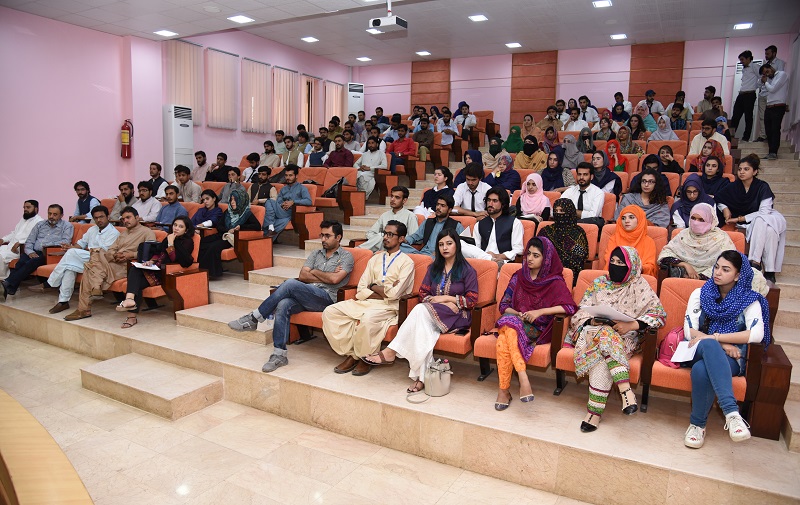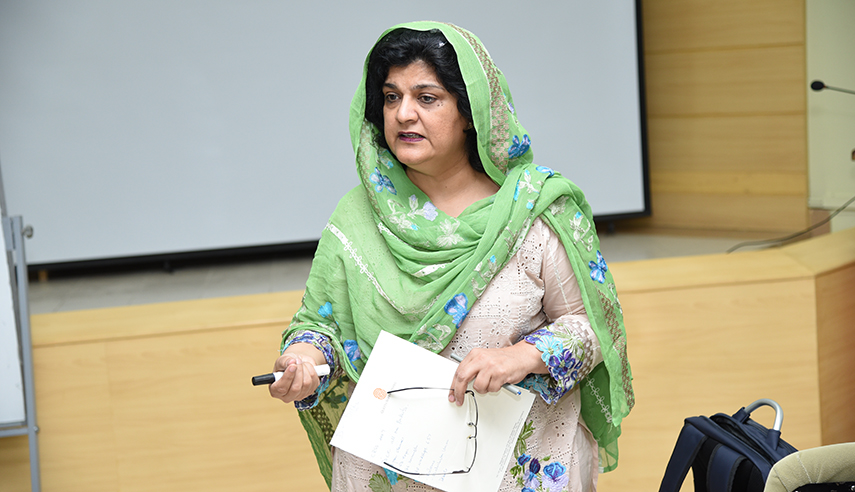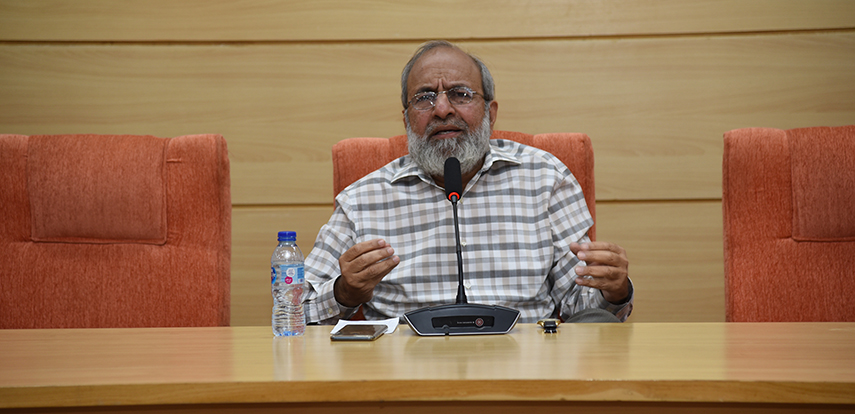The Center for Research and Security Studies (CRSS) conducted the fifth two-day PACE Collaborative workshops and debates for university students, on July 4-5, 2019, in Quetta. The workshop was held at Balochistan University of Information Technology, Engineering and Management Sciences (BUITEMS), Quetta. It was conducted under the umbrella of the Pakistan Center of Excellence (PACE), a counter-radicalization, pluralistic values focused project, in collaboration with the Dutch Government.
Participants included students from Balochistan University of Information Technology, Engineering and Management Sciences and University of Balochistan. Project Manager, Ms. Farhana Kanwal started off the workshop with an introductory session and welcomed the participants to the workshop. Ms. Kanwal said that PACE is a counter radicalization initiative by CRSS which was started in September, 2015 and completed its first phase in September, 2018. The core objective of PACE is to indoctrinate the habit of questioning and critical thinking among the youth of Pakistan. She added that the purpose of such activities is to bring together the youth at one platform and discuss about critical issues of multiculturalism, diversity, democracy and accountability. Youth is the shaper of future and whole objective of reaching out to them is to prepare a cadre of young people equipped with the tools of critical thinking. We believe that today’s younger generation has the ability to adopt new ideas and question preconceive narrative of intolerance. She stressed on questioning to start the process of positive transition of a society. She also stressed on including all the marginalized groups for a greater cause of peacebuilding and social cohesion. Ms. Farhana elaborated on the success and achievements of PACE in its first phase and also the objectives of PACE Evolution.
Mr. Iftikhar Ahmed, Head of the Department of Mass Communications, BUITEMS expressed his gratitude over having PACE Collaborative Workshop conducted at their university. He said that social transformation of a society takes place if we disconnect ourselves from a stipulated set of biased behaviours. Mr. Ahmed also elaborated that the objective of these workshop is not limited to gather people for two or three days but the implementation of the core values discussed at this platform needs to be implemented in our lives for collective good.
Mr. Muhammad Sadiq, Lecturer University of Balochistan, also expressed his views. He said that we really appreciate and acknowledge the efforts put in by CRSS for development of a socially integrated Pakistan. The kind of seminars CRSS is conducting help shape the minds of youth in a positive direction that is the basic requirement for diminishing the differences and respect the diversity.
The first formal session of the day was kicked off by Ms. Shagufta Khalique on ‘Equality, Diversity and Tolerance’. She started the session with an activity on differences and similarities among the students. The activity concluded with diversity being about differences yet accepted and respected. She said that diversity means being unique and different from others. Being different is beautiful because homogeneity is stagnant and static. She added that diversity brings out the different colours which should be celebrated. Each individual has a different personality with multiple traits and perspectives. Diversity is respected when we start developing a habit of listening to others and understand their perspective on life. Pakistan is a very diverse country with regard to ethnicities, cultures, religions, languages and genders. Diversity being present in a society is a permanent factor which cannot be altered. There are certain stereotypes regarding various ethnicities or religions which need to be challenged and changed. No trait is a permanent part of any religion, culture or ethnicity, being different is natural. Stereotyping is the worst kind of discrimination.
Ms. Yusra Amjad delivered a session on equal citizenry from the perspectives of women empowerment. She held an interactive session with the students enlightening them about the marriage contract and how patriarchal it is, as the entire process requires a male family member. The contract has no female representation and the right of divorce is automatically cancelled out leaving the girl with no choices at all except of khullah. She thoroughly discussed about Article 18-20 that give the right of divorce to women as well as protect her rights with allocation certain additional conditions. She further discussed about honour killings in Pakistan. She brought to light how the character assassination of the victim immediately weakens the case. A brother who has murdered a sister may be relieved of all charges if a next of kin of the murdered forgives him. She stressed on how these laws call for amendments and that the constitution does not actually protect its people especially women. The session broadened the perspectives of students regarding the process of Nikkah and honour killings.
Dr. Khalid Zaheer is a renowned religious scholar and have a handful on religious teachings and interpretation. His session was on ‘Religious Freedom, Fundamental Rights and Social Inclusion.’ Dr. Zaheer explained the concepts of religious freedom and social inclusion with referring to Quranic verses. Our religion strongly advocates religious freedom and doesn’t like imposition of beliefs and ideas on others. He said that the Holy Quran is internally consistent and there is no contradiction in it. However, some of the verses are interpreted differently to create chaos, and sometimes for personal gains. Allah describes humans as sons and daughters of Adam and Eve to bring them all in an equal position; despite being their religion, race, ethnicity, language, culture and gender different. Islam gives equal rights to all with any discrimination and whoever does so is going against its teachings.
He said that religious tolerance is a right everyone should give to others, to believe in and practice faith of their choice. Fundamental human rights a guaranteed in Islam and the last Sermon of Our Holy Prophet gives an elaborative explanation of it. The Sermon is the best example of inclusion by ensuring the rights all marginalized groups.
Mr. Shireen Khan is a lecturer at Mass Communication department and has expertise in ethics and legislations in media. He spoke on ‘Ethics in Media,’ highlighting the basics of being a journalist or a reporter. He shared that ethics is the study of morality specially the rights and wrongs of how journalists do their jobs. It involves defining the morality, acceptable values of individuals, organizations, professions, and society by using those values of human behaviour. He added that ethics were first embedded in First Amendment in US Constitution in the Bill of Rights. He also talked about the five key values of journalism as accuracy, independence, impartiality, humanity and accountability. While explaining these core values, Mr. Shireen added, sensationalism should be avoided and self-censorship should be considered. Biased and abusive attitude should not be accepted. He stressed on the importance of being neutral and presenting authentic news.
Dr. Jan Muhammad Dean Faculty of Basic Sciences and Arts, BUITEMS thanked CRSS for their peacebuilding efforts and promoting equality, diversity and tolerance during his concluding remarks. He said that we look forward to more of such seminars because it give an in-depth knowledge of the ideas that are not discussed or encouraged in our daily lives.
Ms. Farhana Kanwal closed the session with highlighting the importance of debates and critical thinking. She said that debate is a way of identifying and discussing the issues with logic and reason. She further said that an ideal society would always look beyond differences and there will be respect of rights and opinions for all with no discrimination. Ms. Kanwal also thanked the participating universities and students for their support and encouragement.




